-
•
•
2 responses
I’ve loved the Holy Week series that Eric has posted. I hope I’m not interrupting with this post. But I think it’s fitting this Easter to also remember other pioneers and prophets who have given their lives to help make men free — and especially so, when one such man died 42 years ago today. And so I hope you’ll permit a link to a hymn of a different sort, a poem which openly connects the lives of two people who lived and died . . . in the name of love. Read More
-
•
•
6 responses

This is a bit gratuitous (let alone a tad self-promoting), but this Sunday at noon, between conference sessions, BYU-TV will be airing a documentary on the Choir, focusing particularly on our tour last summer. Entitled “One Voice: On the Road With the Tabernacle Choir” it includes behind-the-scenes and in-front-of-the-audience footage, as well as interesting interviews with Mack Wilbert, Choir leadership and administration, organist Rick Elliott, and others. There are also a handful of short interviews with me . . . Then, at 5:30 that same day, BYU-TV will broadcast out final tour concert at Red Rock outside of Denver. For… Read More
-
•
•
2 responses
D&C 138; 3 Nephi 9 and 10 Christian tradition relates the so-called “Harrowing of Hell,” wherein Jesus broke the bonds of Adam and Eve and brought them and other Old Testament saints from hell into heaven. Although LDS doctrinal statements do not include statements such as “and he descended into hell” as do the Apostolic and other creeds, Restoration scripture does stress that “he descended below all things” (e.g., D&C 88:6, 122:8). The real state of the righteous dead before the Atonement of Christ and Jesus’ own activities among them during the time that his body lay in the tomb… Read More
-
•
•
10 responses
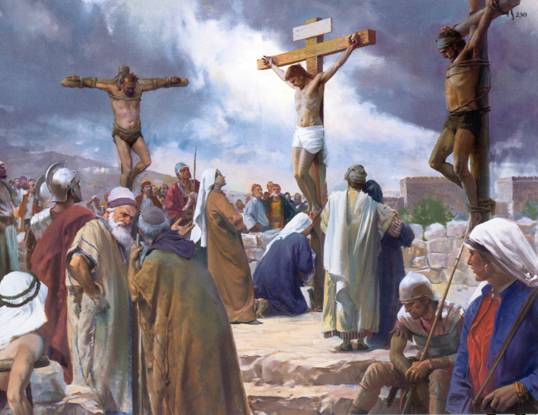
The day traditional associated with the crucifixion of Jesus, the Friday before Easter, is called “Good Friday” in English either because it is a “holy” Friday, or, more likely, because in English “good” is often an archaic expression for “God.” Hence “goodbye” for “go with God.” Accordingly it is “God’s Friday” because on this day was the culmination of God’s reconciling the world to himself through the death of his Son. Matt 27; Mark 15; Luke 23; John 18:28–19:42; see also 3 Nephi 8 Jesus in the Hands of the Romans (Mark 15:1–21; Matt 27:1–32; Luke 23:1–32; John 18:29–19:17a) At… Read More
-
•
•
One response
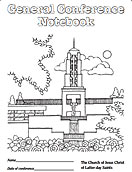
Our very own Kylie Turley has had her hands full of late, but wanted us to post a link to these fantastic General Conference activities for the kiddos. Enjoy. Read More
-
•
•
5 responses
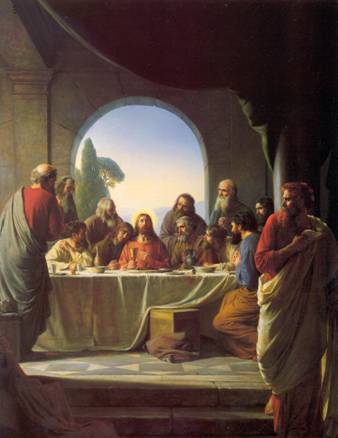
“Maundy” is an early English form of the Latin mandatum for “commandment” and recalling “A new commandment I give you, that ye love one another; as I have loved you, that ye love one another” in John 13:34. The events of Thursday night, beginning with the Last Supper and extending through our Lord’s suffering in Gethsemane, his betrayal, his arrest, and his first hearing before the Jewish authorities, reveal his great love for us. Read More
-
•
•
2 responses
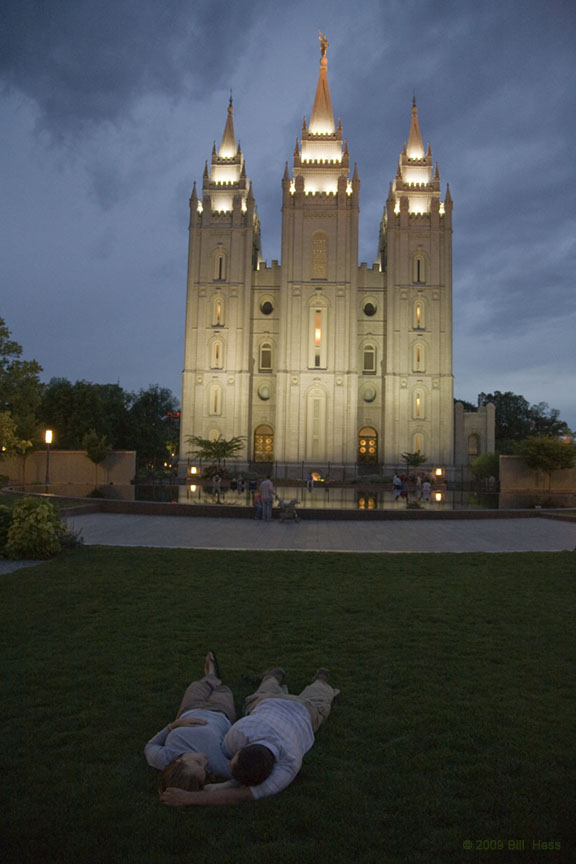
The night after we buried my mother, in a hill at the foot of the Wasatch from where her second favorite temple can be seen. Her favorite was Logan, where she was sealed to my father, who would soon follow her to the grave. Read More
-
•
•
154 responses
This story in the Arizona Republic got me thinking. It recounts the temple wedding of a Mormon convert. His mother opposed his baptism, and when it came time for him to be married she was devastated by her inability to attend the ceremony. The article was, I thought, a poignant telling of the story, one that nicely captured the mother’s pain. Among other things, the article notes that in countries where marriage must be a civil ceremony Mormons are allowed to be sealed immediately after a non-temple wedding. But not so in the United States, where a couple must wait… Read More
-
•
•
2 responses
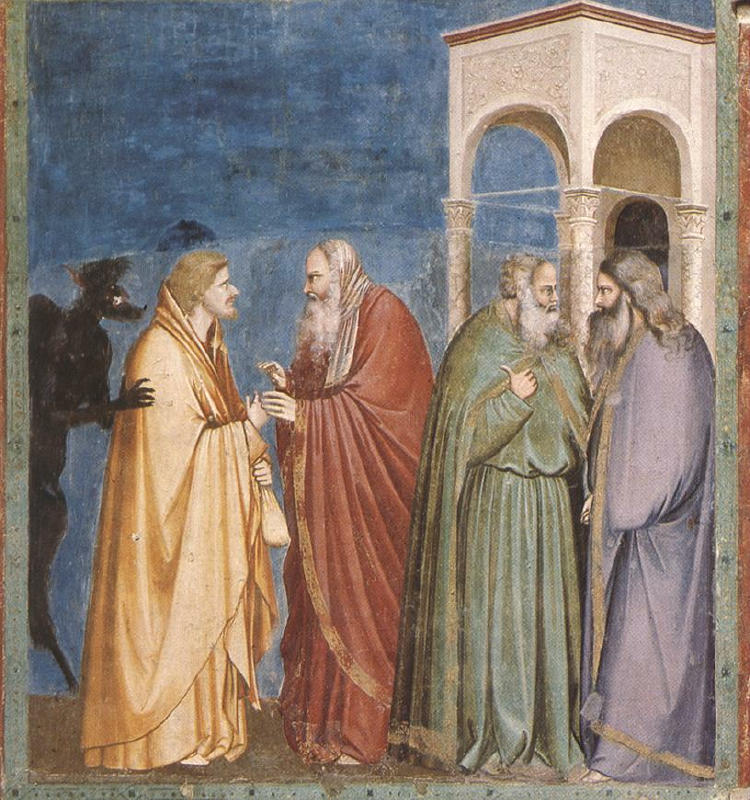
In some traditions the Wednesday before Easter is called “Spy Wednesday” because this may have been when Judas agreed with the chief priests to betray the Savior. This act of betrayal is highlighted by its collocation with an act of love, the anointing by the unnamed woman in Bethany. Read More
-
•
•
One response
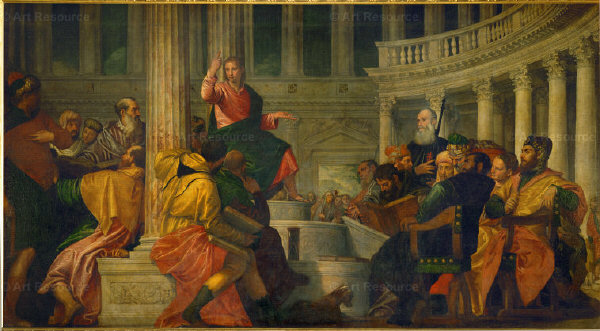
After drawing lessons from the withered tree, Jesus spent the morning in the temple. The second block of these teachings in Matthew, which also cover most of the material preserved in Mark and Luke, focus on attempts by the Pharisees, Herodians, and Sadducees to trap Jesus in his words (22:15–40). Read More
-
•
•
5 responses

The most recent baptism in our family. I wish I had a similar photo of our daughter, but, of course, I wasn’t in the change room with her. Read More
-
•
•
7 responses

Last night I was considering the “what” and “how” of Zion. After reading the comments from that post, I see that I’m skipping past the “why”. If I want to understand how Zion will work, I first need to understand why it exists — what it’s intended to achieve. The scriptures exhort us with eager anticipation for the prophesied Zion. They even go into some detail on visions of its dimensions and inhabitants. But they don’t say what it’s for, or why we should be excited about it. So what’s it for? And for whom? One key question to answer… Read More
-
•
•
3 responses

While readers are more familiar with Jesus healing and blessing rather than “cursing,” the story of the Fig Tree is important for our day. Just as the Jews of Jesus’ time were held accountable for brining forth fruit, so, too, are our lives expected to reflect that of Jesus. Read More
-
•
•
49 responses
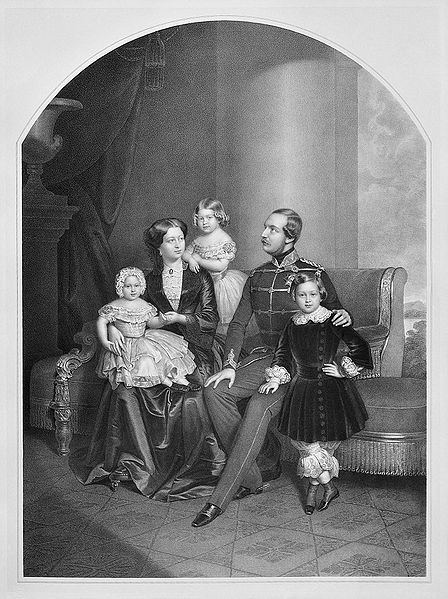
Take a minute and review the tenth article of faith with me, if you will: We believe…that Zion (the New Jerusalem) will be built upon the American continent. What does this mean? How is this city different from any other city? I imagine that most church members picture this Zion as a magical, idyllic dwelling place, free from sin and suffering. But an image of what the city looks like doesn’t tell us how it came to be that way. If Zion is a utopia, what attributes and qualities does it possess that allows it to be one? I don’t… Read More
-
•
•
5 responses

Looking for some yummy snacks among the #10 cans. Good luck! Read More
-
•
•
8 responses

Palm Sunday is a good opportunity to recall one of the rare moments in Jesus’ ministry when he was recognized for the king he was. But depending upon the timing of Passover and the day that Jesus was crucified, this Sunday could also have been “fifth day before Passover” when the Paschal Lamb was selected for Passover and set apart for the Lord, giving special significance to crowd’s recognition of Jesus on this day—they may have been welcoming him as a hoped-for king, but in reality he had come as the Lamb of God who would die for them. Read More
-
•
•
3 responses

As a prologue to our journey through the Savior’s final week, considering another, implicit level of symbolism inherent in the accounts of Jesus’ anointing provides depth to Jesus’ role as “the Christ.” John’s placement of the anointing before the Triumphal Entry can be seen as portraying Jesus as the rightful king who enters Jerusalem with authority. The location of the anointing in Mark and Matthew on Wednesday of Holy Week signals a shift in emphasis as Jesus begins to function as the anointed priest who makes the ultimate sacrifice for his people. Read More
-
•
•
3 responses
The Los Angeles temple at night. Read More
-
•
•
69 responses

The Atlantic’s food channel recently posted an article entitled Jello Love: A Guide to Mormon Cuisine (my co-blogger kindly linked to it in the sidebar). The author lived in Utah for a time as child, and she knows whereof she speaks. The piece is charming, nostalgic and mostly reality-based. But I blog, therefore I quibble. Classic Mormon fare seems to have crystallized as a cuisine in the 70s or 80s, though I couldn’t tell you why that’s so. In a lot of ways, its provenance is a bit of a mystery: I doubt that any of the dishes originated among… Read More
-
•
•
For most traditional Christians, the basic chronology of Jesus’ last week is fairly clear: he entered Jerusalem on Palm Sunday; taught and prophesied for two or more days; held the Last Supper and was arrested on Thursday evening; died on Good Friday; and rose from the dead the morning of Easter Sunday. To make a devotional study of the Savior’s Final Week simpler, in past years posts and in last year’s Ensign article,[1] I have avoided detailed chronological discussions. Here, however, I want to provide interested parties with more background to the issues involved in this study, after which I… Read More
-
•
•
5 responses

In the bustle of day-to-day life, it is useful to employ holidays to refocus our attention and our thoughts and, most of all, celebrate together and with friends of other faiths the events we all value. For some years now, my family and I have benefited spiritually by using the gospel accounts of the Savior’s last week as the focus of our family and personal scripture study. It is a great way to truly celebrate Easter! Read More
-
•
•
5 responses

This photo was taken the week before we moved across the country and left all of our family back home. Just a warm summer evening, feeding the ducks with Grandma and Grandpa, and enjoying the experience. I never understood why people said it was great to be a grandparent, until I became a parent myself. Though some days as a young mom seem rough rather than fun, I cherish the moments that I get to kiss their warm cheeks, hug their small bodies, and then out of the blue they say “I love you mom”. When my little ones are… Read More
-
•
•
16 responses
The Society for Mormon Philosophy and Theology holds its 2010 conference at UVU this Thursday through Saturday (March 25-27) on the theme of theological anthropology. Invited speakers include: Terryl L. Givens (University of Richmond)—”Finding the Divine in Man: Romantic Angst and the Collapse of Transcendence”; Kevin Hart (University of Virginia)—”The Prodigal Son”; Laurence Hemming (Lancaster University)—”A Singular Humanity: The End of Anthropology”; David K. O’Connor (University of Notre Dame)—”Plato, Purity, and the Iconoclast Temptation: A Catholic Imaginarium” Other session themes include agency and grace, the natural man, human pre-existence, perfectability and theosis. The full conference schedule and abstracts of the… Read More
-
•
•
11 responses
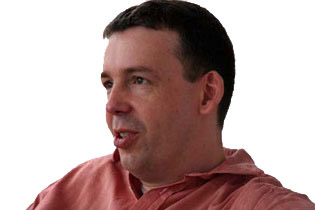
Last week a friend invited me to attend a lecture sponsored by the SLU Theology Club and featuring James Alison, a Roman Catholic priest and theologian. Alison grew up in Britain, was raised in a low-church Protestant tradition, converted to Catholicism, and now resides in Belo Horizonte, Brazil, living as an openly gay Catholic and working with AIDS patients. That collision of proper nouns seemed provocative. The talk was to be titled “The Gift of the Spirit and the Shape of Belonging: Meditations on the Church as Ecclesial Sign.” Even more promising: Catholic ecclesiology shares something in common with its LDS… Read More
-
•
•
67 responses

From my youth I’ve wanted to do right. A desire to follow the Holy Ghost occupied much of my spiritual reflection in my teens and early twenties. I made it a point to be aware of my feelings, and after a time I identified a few particular feelings that I identified as being the Spirit. The most powerful of those feelings was a compulsion to do or not do a thing. When I defied that compulsion I felt guilty and unworthy. I sought the Lord’s guidance in prayer on even very minute matters, and so I would feel compelled in… Read More
-
•
•
19 responses
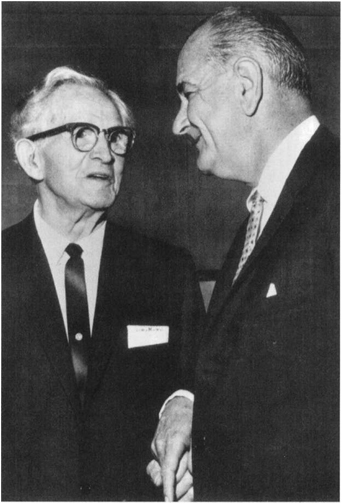
Stewart Udall, U.S. Secretary of the Interior under Kennedy and Johnson and a prominent member of a prolific Mormon political dynasty, passed away Saturday morning at his home in Sante Fe, New Mexico, according to a statement from his son, Senator Tom Udall. Known affectionately as “Stew,” he was ninety years old and the last surviving member of Kennedy’s original cabinet. While he did not remain an active Latter-day Saint in his later life, he nevertheless kept close ties with the Church and continued to self-identify as a Mormon, claiming that he was “Mormon born and bred, and it’s inside me…… Read More
-
•
•
Before looking in detail at the scriptures for this week, consider the following possible chiastic parallels between the story of Moses’s life and the story of Israel’s experience. Of course parallels are what we make of them. Some may see these as more tightly like one another than others do. Some may be skeptical about these chiasmuses, especially since one of them has missing parts. Some may see nothing at all. If you don’t find these parallels interesting, or at least thought-provoking, skip them and go on to the questions. If you do find them interesting, perhaps they will be… Read More
-
•
•
38 responses
This discursive approach to church leadership certainly had its problems (most dramatically in the story being re-told by Daymon and Brad at BCC). It is more chaotic, less predictable, more likely to offend long-time members when long-held doctrines change. However, it is, perhaps, more responsive to the changing needs of church membership. Read More
-
•
•
4 responses
This is a group of mostly single Latter-day Saints from D.C. and elsewhere who are on their way to volunteer in a remote Guatemalan village in the Polochic Valley– one of the poorest in the world. Many of the villagers from this area are themselves Latter-day Saints. The volunteer work done be this group consisted of a variety of humanitarian building projects, educational workshops and medical service. This photograph shows just one of several cattle trucks that transported the group to the village. This volunteer trip was recently featured in Meridian Magazine. by Juanita Verma ___ This picture is part… Read More
-
•
•
125 responses
There is a long-standing tradition in the church to use honorific titles identifying priesthood positions for men at just about every level beginning when they become missionaries. Elder, Bishop, President. Women — even those who hold similarly named positions — are generally referred to as simply “sister.” In my 45 years in the church, I can recall less than a handful of times when a woman was referred to by title. When I was 19 we moved to England while my dad took a sabbatical from BYU. My mom soon made a dear friend in the mission president’s wife. We… Read More
